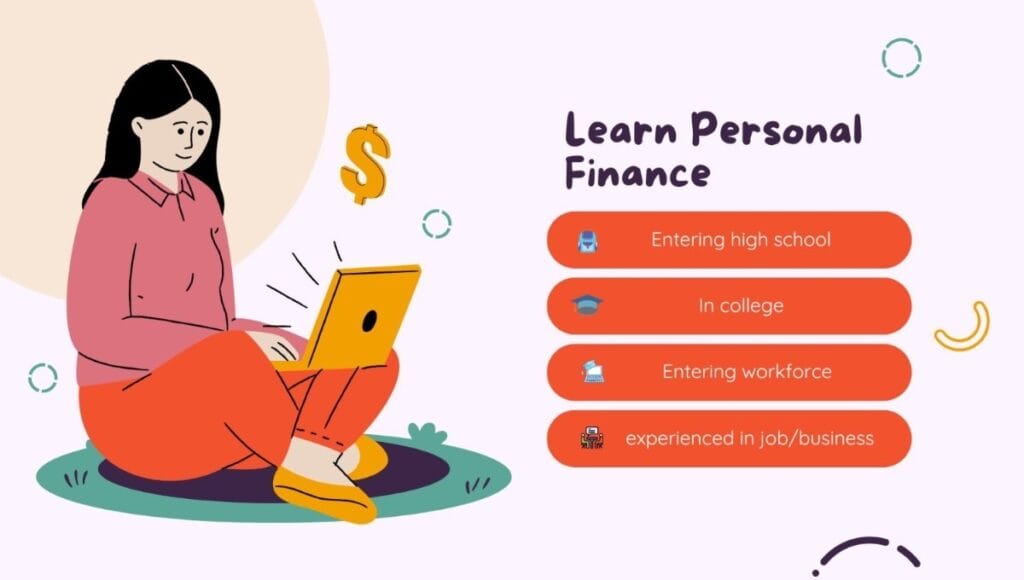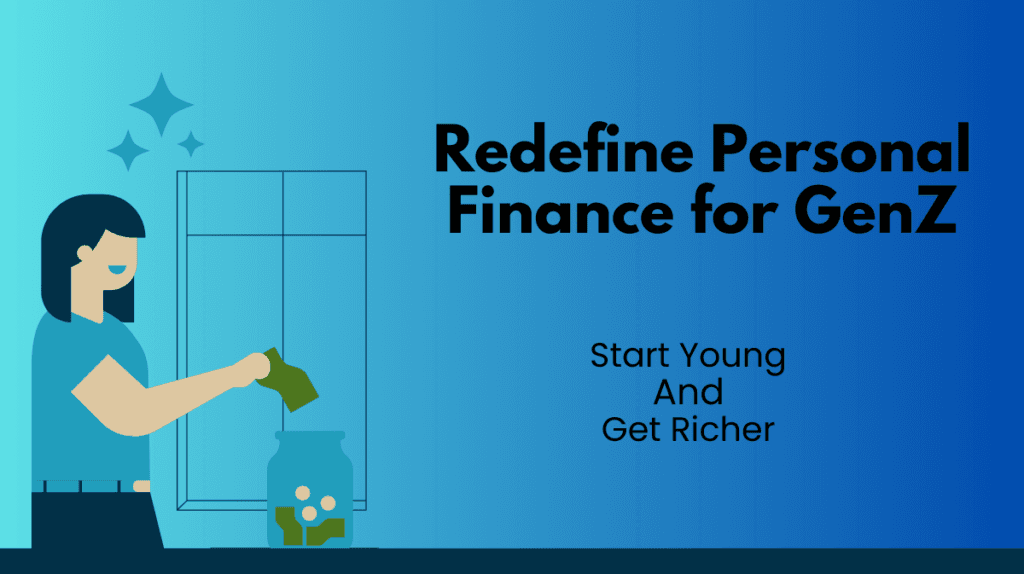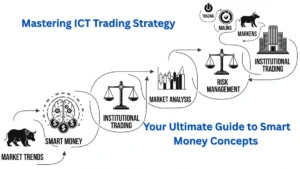Okay Genz. What do we have today? And why this article caters only to GenZ and not millennial or Gen Alpha. No bias towards them. Simply Gen Alpha is too young and Baby boomers might have figured it out by now. If not, you can read along as well. Not sure where you belong, here is how it’s categorized.
| Generations | Born | Current Ages |
| Gen Z | 1997 – 2012 | 12 – 27 |
| Millennials | 1981 – 1996 | 28 – 43 |
| Gen X | 1965 – 1980 | 44 – 59 |
| Boomers II (a/k/a Generation Jones) | 1955 – 1964 | 60 – 69 |
| Boomers I | 1946 – 1954 | 70 – 78 |
| Post War | 1928 – 1945 | 79 – 96 |
| WWII | 1922 – 1927 | 97 – 102 |
Why this article then?

Genz are someone who are now
- Entering high school
- In college
- Entering workforce
- Somewhat experienced in job/business
This is the perfect time to learn about personal finance. How can we make good use of our time/resources? Setting boundaries and financial priorities”.
Most of the schools across the US or I would say world do not teach finance to young minds. And when you start earning you have no idea how to spend, save or invest. How to do retirement planning. After some time, it feels too tedious to learn and it just goes on. It’s critical to inculcate the habit of your money manager. After all, you need a lot of it to lead a comfortable life. So, what is personal finance?
Personal finance in simple terms is understanding how money works in the economy and how you can effectively earn and manage it to achieve your financial goals. Let’s say you are too young to set a goal, or you are still unsure what you want. Still, you should know.
If you are into workforce and have decent amount of money coming to your pocket, consider these things:

1. How money works
Try to understand how money works. How it’s printed and circulated. How it reaches your pocket and exchanges hands.
2. How inflation works
Well, you might know your grandfather has bought a house for 3000-4000$. Can you get it at the same price now? Of course not. That’s inflation. Every year your money decreases in value. The purchasing power of a single dollar comes down. Now according to the government, the inflation might be 2-3% but you know your grocery costs much more than now. And buying a house feels like a dream now.
3. Learn Budgeting
Learn to budget your expenses. Follow this for budget planning. <LINK> Even if you can’t keep up with it daily for the start you should know how much is going out of your pocket.
4. Saving
Putting aside some money for emergencies or for future or retirement. Every month aim to save a portion of your income in a disciplined manner. You can consider certificates of deposits/ liquid funds for short-term saving and liquidity.
This is a crucial step as GenZ’s are torn between Saving and YOLO(You live only once). Remember “You die only once” and you live every day. So, save up. Don’t let internet trends derail you.
5. Investing
Saving money in Bank deposits will not yield higher returns. And remember inflation does reduce your purchasing power. So, look for high yield alternatives for the long term. You can look out for Bonds or stock options. Stock market may look intimidating to most of us but learning bit by bit does help in the long run. If you are someone with a low-risk appetite, go for vanilla index ones. You can pick index mutual funds which invest in NASDAQ or S&P 500 and invest diligently every month and watch your money grow. You can check discount brokers like fidelity, Interactive Brokers LLC, Robinhood etc. Check what works for you.
If you are someone with a high-risk appetite, go for growth stocks and small cap funds.
6. Insurance
Insurance is underrated in personal finance, but it saves you on rainy days. Have you and your family covered for any unexpected medical emergencies and tragic incidents.
7. Credit card debt
This is a topic of much discussion as the US now has the highest debt. Both the government and its citizens. What does the government do to pay off? Quantitative easing. What’s that? Simply printing more money and bringing it to the economy. Which in turn increases inflation and reduces your purchasing power. And now you are in more debt. So, debt management is crucial to learn. Buy what you can afford. So, except your living expenses like food, house, gas everything should be bought with vigilance. Remember “if you cannot buy it twice don’t buy it once”.
8. Real estate / Land / Home buying
“Only two things are certain. Death and taxes”- Benjamin Franklin”
Taxes are everywhere. We are in a high inflationary environment and taxes are going up and up. Learn to manage your taxes. Understanding your tax liabilities and tax saving strategies (ethical way) will help you in the long run.
9. Try side hustle
Most of the GenZ across the world are now against buying a home. Since short-term renting does make sense because you are figuring out your career and you might move. But planning for real estate is crucial as house prices tend to go up rapidly and renting and moving repeatedly takes a toll on you. Here your credit history can help you get good interest rates. So, work on point 7., credit card debts. Start saving for your dream home down payment from the first paycheck.
If you plan to buy after 10 years, invest in long term mutual funds
10. Try side hustle
If you are in a 9-5 job and it feels comfortable to you. It’s time to shake yourself and start a side hustle. Millennials now are struggling with jobs. AI and automation are taking over the world and there is no certainty of paycheck. Also, the cost of living is increasing, and pension may not be sufficient in old age. What can you do now, try a side hustle, learn skills online. Check you can monetize it. Extra income never hurts anyone. If you fail, you have experience, confidence and resources to start over.
Phew that’s a lot. What if you are not working right now? You are in college. All of these apply to you. Don’t get overwhelmed and try learning one thing at a time. If you are in college, your aim should be to study diligently, get good grades and get a job or start a business. You can still learn about the economy, inflation, budgeting, saving and investing. One at a time.
If you are last of GenZ, practically gen Alpha, this may seem daunting to you or irrelevant but understand the gist of it. “Money management is important, and everyone should learn it”. Rest will follow.
Personal finance must be taught in schools so that young minds adapt to it quickly. But if schools don’t teach you look around, practically everyone is earning and managing money some or the way. Learn from it.
Remember personal finance is a journey and every mode of your life will require it to do differently. Practice is and you will get better and better.











